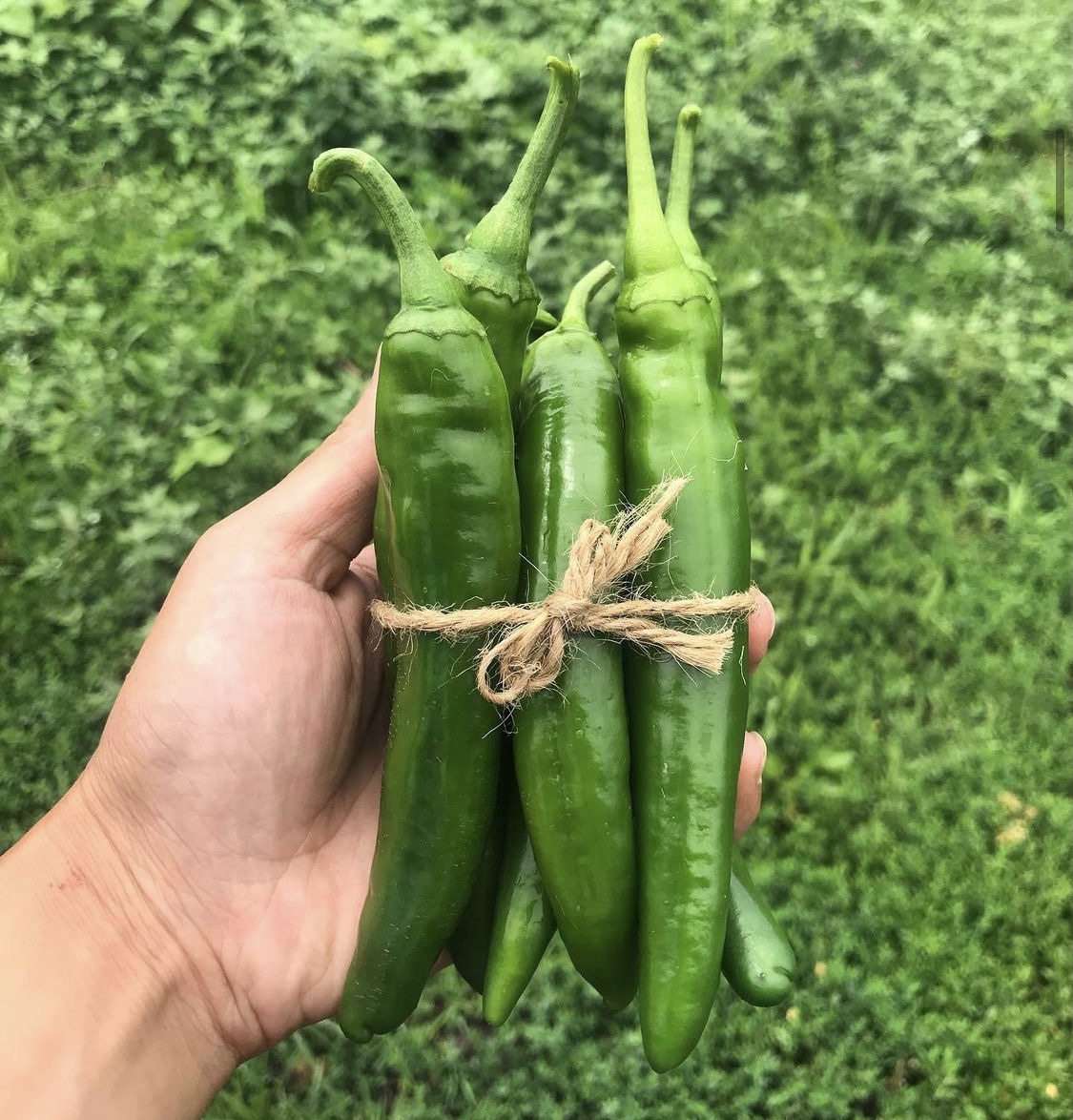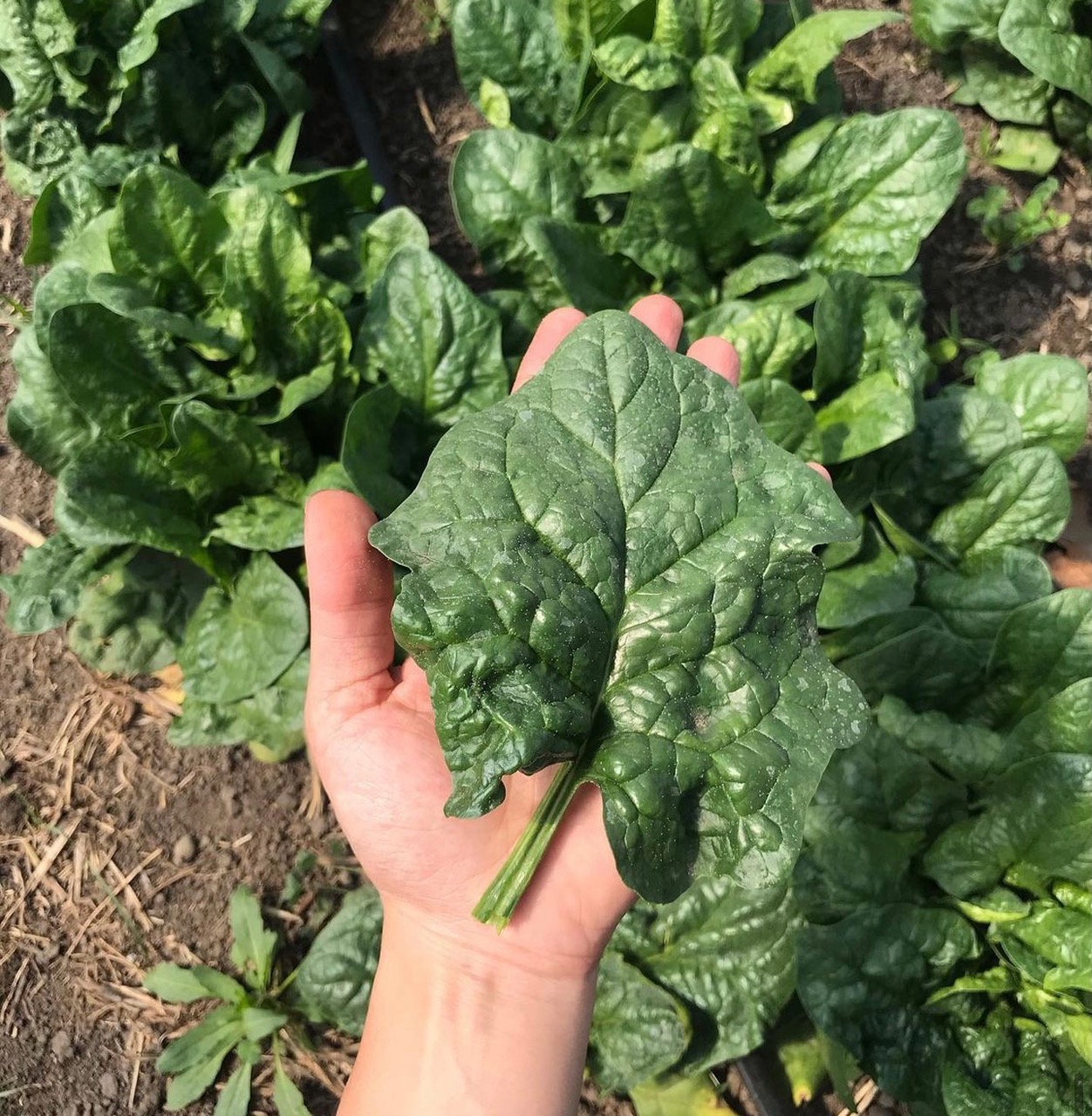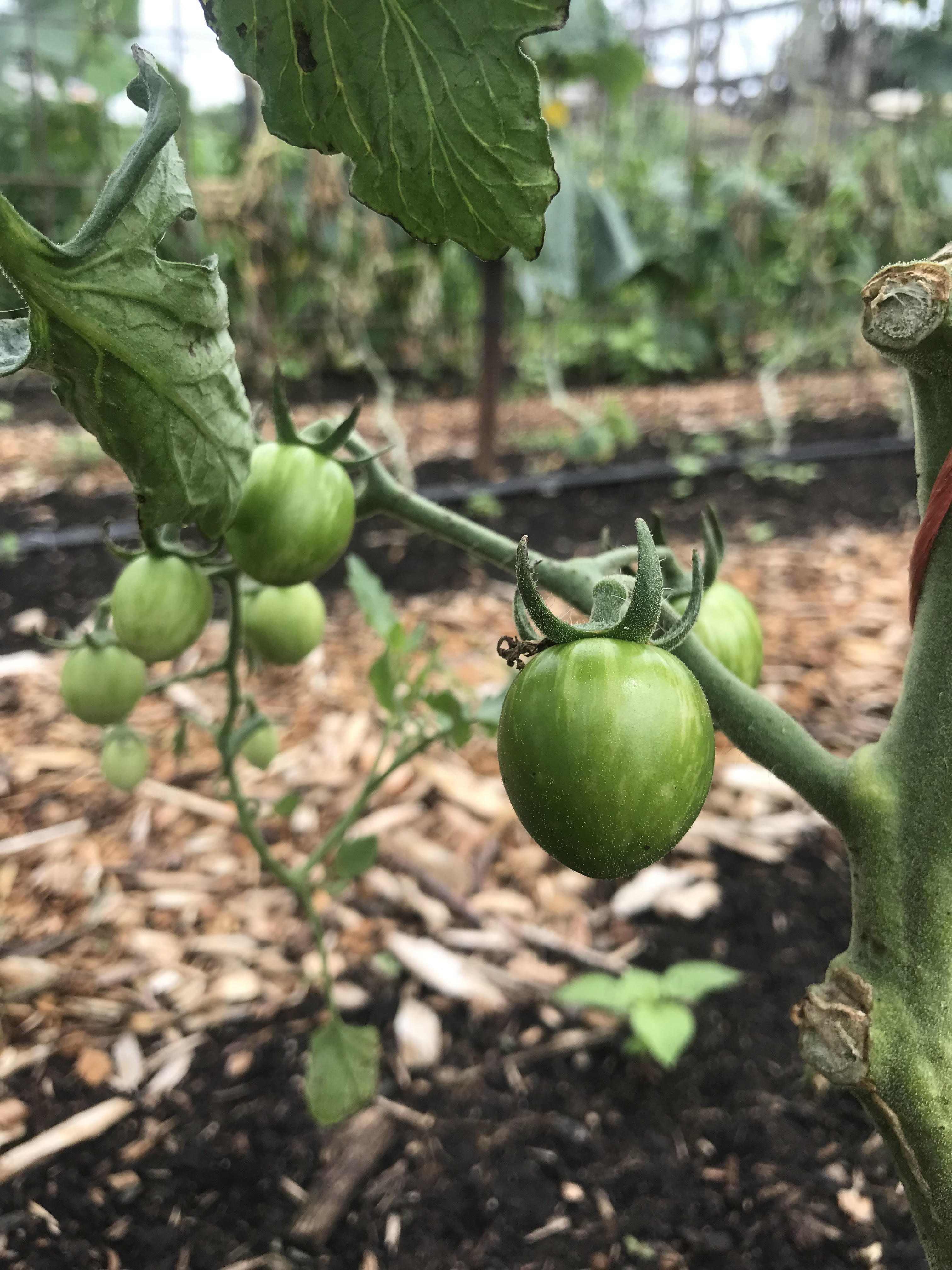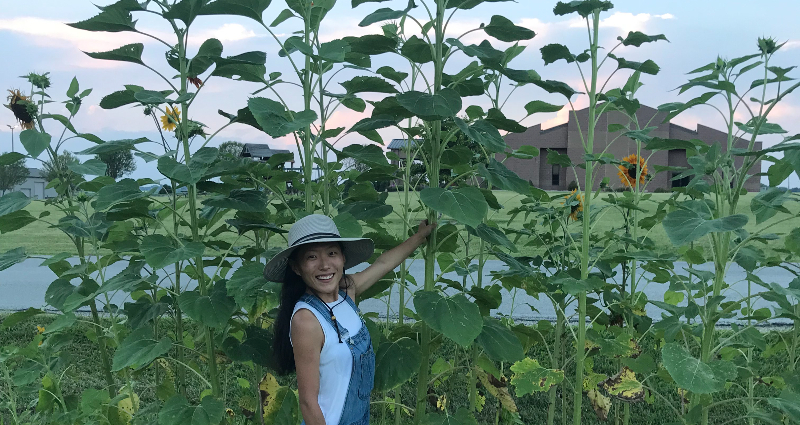Farming isn’t for the faint of heart. It requires a lot of hard work, time, and effort. Pair that with buying a farm in a global pandemic, and you’ve got a extraordinary farmer.
Mikyung Eum, a Champaign resident, started her farm last year, and she has been growing fresh vegetables and sharing on Instagram. Though she is a self proclaimed shy person, she agreed to sit down and answer some of my questions about the farm and how she got into it.
Smile Politely: Can you please introduce yourself and your role on the Humbleweed Farm?
Eum: My name is Miky (like the mouse), and I am the farm-her and owner of Humbleweed Farm.
SP: Can you talk about your background? How long have you lived in C-U?
Eum: I was born in Seoul, South Korea and raised in Chicago. I moved to C-U about nine years ago. I moved to C-U to attend the University of Illinois at Urbana-Champaign. I studied both landscape architecture and early childhood education, and I worked service jobs throughout. Then, I found my calling to be a farmer while pursuing a certificate in Horticulture and Landscape Design at Parkland College.
SP: That’s awesome. How big is your farm?
Eum: The growing space at Humbleweed Farm is about a quarter acre. However, the space in production this year is a bit less than that.

Photo by Humbleweed Farm.
SP: When did you begin the farm, and what was that like? What plants did you start with?
Eum: I officially registered my business in December of 2020 and began planting seeds in February of 2021. Reflecting about it now, starting a business, especially one during the pandemic, was a bold move for me. I remember telling myself in the past that I could never imagine running my own business, but here I am now operating a small farm.
I definitely didn’t know what I was getting into, and in some ways, I’m glad I just embraced the moment and chased after what felt right. Tom Harrison of Crooked Row Farm (now called Crooked Acres Forest Farm) played a huge role in helping me begin this venture. He was actually my instructor for one of my horticulture classes at Parkland College and soon became my mentor. I enjoyed his class so much that I volunteered at his farm one summer. He had arrangements to buy his own farm and move out of state which is when he asked me if I was interested in taking over his space. At first, I wasn’t sure if I was ready, but he encouraged me that I should just go for it. He believed that I could be a farmer from the very beginning when even I didn’t believe it myself. He encouraged me to be confident and to enjoy the process.
The very first crop I planted was garlic, and it was done back in early November last year with Tom. Spinach, Korean peppers, Korean melons, Korean cucumbers, cherry tomatoes, perilla leaves, luffa gourds, carrots, shallots, and borage flowers are crops that I started with in the beginning of the growing season.

Photo from Humbleweed Farm’s Instagram page.
SP: Walk me through a typical day on the farm. What do you do first, then all your tasks for the day?
Eum: On days I am not working at my second job at Delight Flower Farm or working in front of my laptop for my third part-time job, my typical day at Humbleweed starts at around six in the morning. The first thing I do is check the weather and grab myself a cup of coffee. Then, I take the mornings to get some office work done such as writing emails, making lists of tasks to do for the day or week, and tending to any other business matters. I’m at the farm around 8, and the first thing I do is walk through the farm and observe and take notes. If there are orders to fill, harvesting is done earlier and is taken care of first. Hand weeding is a task that I do regularly throughout the day. There’s just no break when it comes to these resilient plants!
SP: Do you have any cool machinery to help on the farm?
Eum: I try to stay away from machines when it comes to the farm. I value the use of my hands and simple hand tools. However, the owner of the land recently bought a Pyroweeder for his operation which I have used once to prep beds for a second round of transplants. The Pyroweeder blasts a controlled heat to kill the weed seeds on the surface of the beds.
SP: What do you currently grow on your farm?
Eum: Carrots, Korean radishes, watermelons, shallots, garlic, sunflowers, borage, Korean sweet pumpkins, cherry tomatoes, Carolina reapers, Korean cucumber, Korean peppers, Korean melons, and luffa gourds are currently in production.
SP: What’s your main crop?
Eum: I’d say Korean peppers are my main crop because they are used a lot in Korean cuisine, and they are also one of my favorite vegetables.
SP: Can you talk about your Gochujang King peppers?
Eum: Gochujang King peppers are Korean hot chili peppers that are used primarily to be dried and made into pepper flakes (gochugaru) or made into pepper paste (gochujang). Gochugaru and gochujang are used a lot in Korean cuisine.

Photo from Humbleweed Farm’s Instagram page.
SP: Can people buy from your farm? How?
Eum: Yes! I am currently selling my produce at three different locations. I use Instagram for individual orders that I receive from my friends and followers. I sell weekly at Delight Flower Farm’s CSA pick-up, and I also sell through an online farmer’s market, Market Wagon.
SP: What’s the best part about working on a farm?
Eum: Oh man, there are so many good things about working on a farm. Learning is probably the most exciting thing. Every day, I learn more about myself. I learn to problem solve. I learn to adapt to changes. I learn to let go of wanting to stay in control, and most of all, farming humbles me.
SP: What’s the hardest part?
Eum: The hardest part is probably being the face of a business. I’m a pretty shy and quiet individual, and so self-promoting and talking to people can be overwhelming sometimes.
SP: You’re doing great. What tips do you have for readers who have home gardens? What grows best? What tips can you share?
Eum: I don’t think I’m at a stage in my farming career to really give tips, to be honest. One thing that I can share right now though is that if you want to grow your own food, Just go for it! There’s no better time than now to start growing something you’ve always wanted to. Every plot of land or home garden differs. Seeds, weather, pests, and soil type differ. There are so many factors to take into consideration when growing food, so the best way to improve is to plant your seeds and figure out what works best for your area.
SP: What made you want to get into farming?
Eum: I was born in a big city (Seoul), raised in a big city (Chicago), and I have never really been on a farm until I began pursuing my horticulture certificate a couple years ago. There isn’t just one thing that made me want to be a farmer. I initially wanted to get into farming because I was just incredibly fascinated by plants. I remember “oooh”-ing and “ahhh”-ing in every single one of my horticulture classes, pretty much every day.
I also wanted to farm because I want to break barriers and stereotypes. As a petite, Asian girl, no one expected me to be a farmer (myself included). Some people told me I couldn’t possibly keep up with the physical demands of the career. I wanted to prove them wrong. I also want to inspire Asian-American girls and women to go after their dreams, regardless of what society or their family tells them.

Photo by Humbleweed Farm.
SP: Can you talk more about being a Korean-American woman owning a farm business?
Eum: Champaign-Urbana has a beautiful community of farmers and food enthusiasts that support my dreams every day. It’s hard to put into words how thankful I am that I am a part of this community of selfless individuals. No doubt though, there are struggles. As a Korean-American woman, I feel that it is difficult to be taken seriously, and so I feel the need to put in extra effort in everything that I do.
SP: Did you have any changes to your farm during the pandemic?
Eum: Not much since I started my business in the middle of the pandemic. I am definitely more aware of food safety because of the pandemic. I try to be conscious of everything that I touch on the farm, so that produce is handled as little as possible from harvest to sales.

Photo by Humbleweed Farm.
SP: What roles do members of your family play on the farm?
Eum: My mom is an investor of Humbleweed Farm. She has given me a small loan for start-up costs. She is also a small business owner in Chicago, and I think she understands the challenge of being a woman business owner.
SP: When you’re not farming, what do you like to do for fun?
Eum: I like spending time with friends and family whenever I can. Spending time with people I love re-energizes me. I enjoy going to live music shows and eating good food. Cleaning is also my guilty pleasure. I hope to make time in the future to create pottery and play the Korean drums again. For now, those hobbies will have to wait.
SP: When you’re not farming, do you have a favorite restaurant or two in town that you like to visit?
Eum: Oh, so many! I’m a big fan of Xinh Xinh Cafe, Thara Thai, The Bread Company, and Fernando’s.
SP: Thank you so much for talking with me today!








